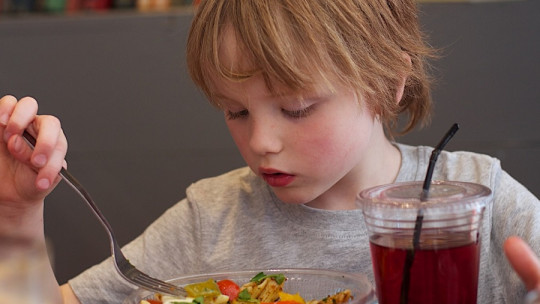
Internalize healthy eating dynamics from childhood It is very important both to avoid malnutrition and to avoid developing Eating Disorders during adolescence and youth in general.
Let’s look at several tips to achieve this from our role as parents.
Let’s start with the basics: what is eating?
The act of feeding ourselves goes beyond a mere physiological need is a true symbol of how we face life, especially through the first significant figure with whom we establish an important bond: our mother.
At birth she feeds us through her breast, and she is the one who usually feeds us in our first years. Eating is the main act that connects us with life, nourishes us and allows us to be alive.
On the other hand, It becomes a social act that unites us with other loved ones
To be more precise, we could analyze in more detail what function the fact of feeding ourselves fulfills: do we eat life through food, how do we do it: energetically, with enjoyment, abruptly, with hunger?
The mouth also allows us to carry out many other actions, such as speaking or expressing ourselves, and is a key part of our appearance, of what we show to others.
Is our society sick?
Today’s society continues to demand of us (despite the change in perspective) a certain image and specific measures exalting youth and appearance above all, the posturing on social networks is increasingly unhealthy and a sector of adolescence does not identify with anything other than its own photos, running the risk of getting confused in them, losing This is how your personal identity is seen.
In short, they perceive themselves as others do, based on the evaluations they make of them, leaving your self-concept in external hands, which is very dangerous, as they have no control over their life, resulting in a fragile ego and a malleable psyche. It all comes down to a number of likes.
If we move to the Internet environment we will find content in digital media that promotes eating disorders such as anorexia or bulimia, with the existence of web pages that encourage practices potentially harmful to health aimed at reducing the number of calories ingested and reach measures below what could be classified as healthy.
So much so that tactics are encouraged such as spraying food with detergent to lead to a feeling of disgust, the use of laxatives, guidelines for self-harm and avoiding the feeling of hunger, or ways of hiding certain bodily signals from the family. They also offer tables of unrealistic body measurements because they are unhealthy and They pressure children and adolescents to inevitably identify with a certain appearance and lifestyle They also encourage self-punishment and poor self-esteem.
The great paradox is that these types of platforms cannot be closed, given that they supposedly do not break the law. Fortunately, that is changing and an example of this is the following: in March 2019, a Decree Law was approved in Catalonia that acts against those companies or platforms that advocate anorexia and bulimia on social networks and the Internet
These platforms could be sanctioned if, despite being aware of that content on their platforms, they did not take action to eliminate it.
In fact, on December 18, 2019, the following news was published: the Irish company Automatic Inc was fined 85,000 euros for advocating anorexia and for not having adequately met the previous requirements of the Generalitat.

What are anorexia and bulimia?
The two most common Eating Disorders are anorexia nervosa and bulimia
While the first is a severe pathology that is characterized by an uncontrollable fear of weight gain and by the development of actions aimed at excessive weight loss, the second (which also begins through dietary restriction) consists of manifestation of binge eating and purgative behaviors leading to compensating for possible weight gain.
How does the family influence the development of these disorders?
Each family is a different system, it is not clear if the relationships between its members are the origin of the disorder, however, we can assure that a series of common patterns have been identified that usually appear in those with members with these pathologies.
In the case of anorexia, these are usually families characterized by overprotection, the involvement of children in parental conflicts relationships manifest themselves in the form of an amalgam, they avoid conflicts and there is rigidity when it comes to accepting changes.
In the case of bulimia, there is an excessive interest in academic and work achievements to the detriment of other objectives such as leisure moral or intellectual issues, appearance and what they will say matter a lot, parents lead an emotional overflow in the form of anguish that at first glance may appear to be disinterest in the member’s illness, specifically the father usually handles himself with negligence and lack of involvement, while the mother tends to blame the sick daughter for the problem.
This happens to families because of their inability to handle stressful situations its low tolerance for frustration, lack of cohesion and little emotional connection that contrasts with the absence of privacy of both belongings and spaces that are shared without prior permission, error (even the smallest) is not tolerated in this type of families.
Family therapy has proven to be very useful in the treatment of these pathologies.
What can we do for our children from a young age?
Here you will find several tips to keep in mind to achieve this.
1. Do not give a negative connotation to meal times
It shouldn’t be a power struggle it is important to emphasize the positive aspects of the experience.
2. Let’s avoid rewarding or punishing with food
The act of eating must be pleasant and framed in a pleasant and relaxed atmosphere, so We must strive to create a space of calm and positivity, without shouting or arguments
On the other hand, forcing someone to eat a food the hard way can cause rejection of it.
- You may be interested: “What is punishment in Psychology and how is it used?”
3. Do not watch television or use other devices during meals
It is important be aware of the act of eating Let’s involve the children in preparing simple meals, even if they stain more than necessary.
4. Educate about food
Let’s take them to the market and teach them the names and characteristics of foods In addition, it is important that we educate on a healthy diet and habits. The goal is for them to develop a good relationship with food, to come to love it.
- You may be interested: “10 tips to learn to control impulses”
5. Harness the potential of creativity
It is more educational to try to get them to try different foods by using creativity, making them more palatable and being flexible with respect to their preferences; If we are realistic, no one likes absolutely all foods, although it is important that they maintain a receptive attitude to new flavors and textures.
With the little ones, the act of eating can be approached in a playful and imaginative way as long as we focus on the food.
6. Boost your self-esteem
Let’s cultivate good self-esteem in them putting emphasis on their personal qualities rather than physical ones
You have to be careful with comments about physical appearance (“I’ve seen that you’re getting fat”), especially during puberty and adolescence, stages in which image is essential for self-esteem.
Conclusion
Ultimately and as always, the emotional education of our children is the most powerful weapon we have to transmit strength and values that allow them to confront the negative messages of our society and their own insecurities.
If we treat them with respect and dedication, if we maintain good communication with them, they will become mature and responsible adults. And let’s not forget that we are always their role model.








